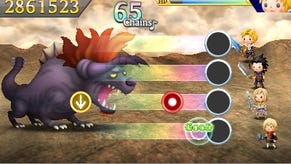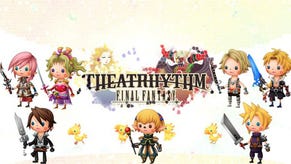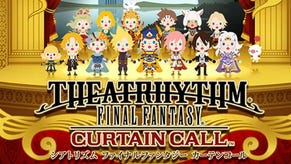Theatrhythm Final Fantasy: Curtain Call 3DS Review: Nostalgia Delivery Device
Some of the best RPG music of all time comes to the rescue of a thoroughly average rhythm game.
This article first appeared on USgamer, a partner publication of VG247. Some content, such as this article, has been migrated to VG247 for posterity after USgamer's closure - but it has not been edited or further vetted by the VG247 team.
Theatrhythm Final Fantasy: Curtain Call takes the form of your average Japan-developed rerelease. Slap in a little extra content here and there, make some tweaks, then give it a subtitle which identifies this version of the game as the superior one.
It's the perfect move for people like me, who never bothered looking into Theatrhythm when it released just a few summers ago. And so, my patience—or I guess apathy, in this case—has been rewarded with the better version of a game 3DS owners fell in love with back in 2012. That said, since I don't have a lot of familiarity with the first edition, I'll be judging Curtain Call on its own terms, and you can check out Kat's Second Opinion below to see how it stacks up against the original release.
Curtain Call acts as an interactive Final Fantasy jukebox, paired with a framing device that lifts some light RPG elements from the series. As with Rock Band and countless other rhythm games, nodes come flying at you down a pathway, and you're tasked with tapping, flicking, or dragging the stylus to catch them all—you can use non-touch controls this time around, but it's not recommended. Curtain Call presents its songs as scenes ripped directly from Final Fantasy, and your input typically translates into making characters strike enemies or speed across an old-school world map by foot, chocobo, or airship.
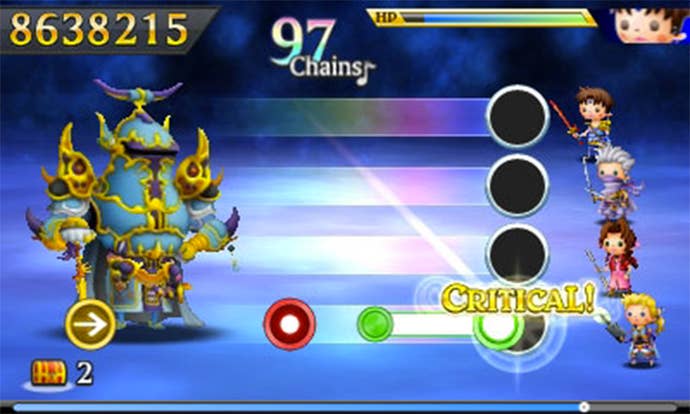
Since Curtain Call contains over 200 Final Fantasy tracks, it goes for a more modular design—which initially disappointed me. Instead of "building" a song, a standard element of most rhythm games, your input has no effect on the backing track, outside of a sound effect (which can be changed to one of many) that plays when you successfully hit a node. Regardless of whether you're doing great or completely screwing up, the music never changes, leaving the core game much less reactive than it could have been. And, at times, the sound effects layered on top of the music often clash with it horribly. These noises tend to mesh well with percussive battle tracks, but the more subdued ones end up sounding like they're being conducted by a toddler randomly smashing together pots and pans.
This downside would be hard to overlook if Curtain Call didn't provide so much content. If you have some favorite Final Fantasy songs, odds are you'll find them here, along with dozens of secretly amazing others. Sure, "One Winged Angel" is the bee's knees, but who knew that Final Fantasy: Mystic Quest's battle tracks were so rocking?
Along with this variety in song selection comes a great number of ways to play Curtain Call. Your party can hold four characters, who each level up independently and can be granted song-affecting skills. Curtain Call also gives you free reign over how to assemble your team, allowing you to mix and match between characters from different installments. I chose to unlock my old buddies from Final Fantasy VI first—that pack of losers from Final Fantasy XIII can wait until I'm ready.
While you can jump into the game and immediately start playing any number of songs, Curtain Call's biggest feature comes in the form of "Quest Medleys," which places a succession of challenges (with the possibility of treasure) on a world map, and tasks you with reaching the end without spending all of your HP. Outside of Quest Medleys, your HP meter refills with every new song, but this mode acts as an endurance test—though you can use items to aid in survival. Quest Medleys exist as nothing more than glorified playlists, but the framing device works well to sell the illusion of an RPG, as does the nearly endless stream of rewards Curtain Call provides. Finishing any song in any mode will usually give you a motivational burst in the form of a level-up, the addition of a new track, or a new option to further customize the game. True, most of these rewards don't rank higher than "trivial," but the RPG trappings made it hard to put Curtain Call down at times—I had a number of "just one more song" moments until I stopped lying to myself.
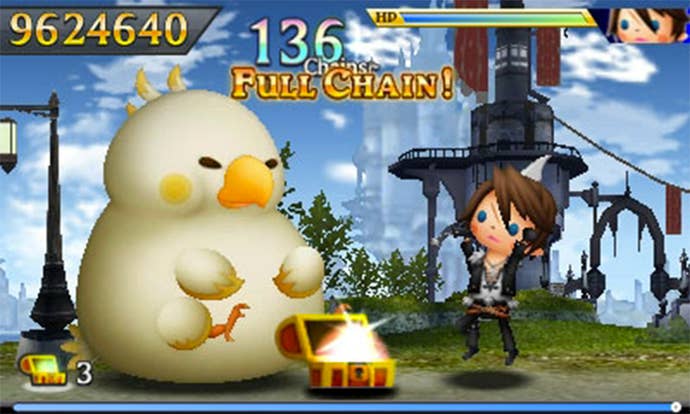
This new version of Theatrhythm also contains a Versus mode, which works, but doesn't strive to do more than the obligatory. As expected, you square off against an AI, local, or online partner, and your success makes their nodes harder to hit through a handful of devious effects (and vice versa). It's fine, but since you can't actually see your opponent—especially the hell you're causing them—the competition amounts to Curtain Call comparing two scores at the end of a song. This mode is a great source of collectible cards, which help increase the stats of your party members (and it even provides a ranking system), but it's hard to get excited when your opponent is only present via a tiny health bar in the corner of the screen.
It may seem unfair, but because Curtain Call contains some of the best video game music in history—and so much of it—developer indieszero doesn't really have to try all that hard. While I'd like a much more substantive rhythm game to serve as the foundation for these amazing tracks, the sheer amount of content here makes Curtain Call worth it, at least to a newcomers like myself with a soft spot for Final Fantasy. If you can handle a lack of ambition, this latest edition of Theatrhythm acts as the perfect nostalgia delivery device, one designed to let you relive the best parts of Final Fantasy in tiny slices.
Second Opinion, Kat Bailey
I thoroughly enjoyed Theatrhythm Final Fantasy the first time round and thus really looked forward to playing Curtain Call, but I wasn't entirely sure how indieszero could substantially improve on the original game. The answer, it turns out, is new content. Lots and lots of new content.
In addition to the DLC from the original game, Theathrythm adds in tracks from Final Fantasy XIV, Lightning Returns, Crisis, Core, and a variety of other spinoffs. Even Advent Children and Mystic Quest make an appearance this time around, making it by the far the most comprehensive collection of Final Fantasy music around. And in a tribute to just how good Final Fantasy's soundtracks have been over the years, the majority of it is quite good. "Battle on the Big Bridge" is an old favorite, but I was surprised by how catchy some of Mystic Quest's tracks could be. Who knew, right?
Even better, it's all accessible from the start this time around (though you have to play for a while to unlock the various modes for some reason). I'll admit that I enjoyed the flow of working through each Final Fantasy's collection of tracks in the original game; but I'm glad to see that Curtain Call cuts to the chase and opens up Expert and Ultimate Difficult right from the beginning. I'm not what one would call an elite player—certainly not in comparison to my friend, who managed to earn SSS ratings on every single song playing on Ultimate—but the basic difficulty is definitely much too easy for me. I'm glad I didn't have to slog through it this time around.
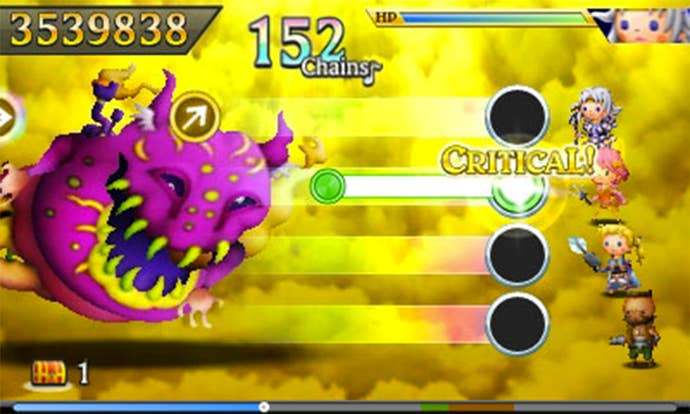
My feelings are admittedly mixed on the rest of the new content. I like the notion of playing against humans and the computer in a Versus Mode—the ladder format in a weird way kind of reminds me of my time playing Armored Core—but the "EX Bursts" are a bit much. I recognize that they're meant to add a degree of difficulty by forcing you to deal with various wrinkles like hidden notes and faster speeds, but they also detract of my enjoyment of the actual song. I'll be bobbing along to "Dancing Mad" or something and the next thing I know the notes will be bunching up and spreading apart, making them almost impossible to hit on the higher difficulty levels. When Bob and I were finished with our multiplayer session, I had to laugh when he texted me with a "WTF" because that's pretty much how I felt.
As for the Quest Medleys, I mostly like that they add an additional dash of RPG elements to the gameplay while also lending the formula some more structure. Without difficulty modes and the like to uncover, the Quest Medleys are a welcome way to unlock new characters and songs without playing through "Decisive Battle" a hundred times."
Bob mentioned that he hadn't played Theatrhythm Final Fantasy until picking up Curtain Call; and if you're in the same boat, I wholeheartedly recommend going out and picking it up since it's pretty much the definitive version. As rhythm games go, it can feel a bit overdone at times, layering on what can occasionally feel like misplaced RPG elements and splitting the songs between three different formats (full confession: I find the "Event Mode" incredibly awkward, even if I love the montages). It's as nice a tribute to Final Fantasy as your'e ever going to find.
As for those who played the original game and are wary of double-dipping, I would say that Curtain Call is worth the additional investment. The huge number of new songs (so many songs) and characters, in addition to the new modes, make it worth picking up in my opinion. Like I said, I spent a lot of time with the first Theatrhythm, but I have no qualms about revisiting some of my favorite songs in the midst of working my way through one of the numerous Quest Medleys. The expanded Final Fantasy VI soundtrack alone can keep me going for ages.
In all, Theatrhythm Final Fantasy continues to do a commendable job of curating the tremendous amount of excellent music the series has to offer, delivering it an accessible and amusing format for everyone to enjoy. I'm glad to be playing it again.
VisualsThe expressionless, dress-up doll recreations of your favorite Final Fantasy characters may seem a touch creepy at first, but Curtain Call's devotion to this 2D style will eventually grow on you.
SoundSimply put, Curtain Call contains some of the best music ever heard in video games. If you like that kind of thing, this is where you want to be.
InterfaceSimple and efficient, with clean and attractive menus. And the stylus action always feels right.
Lasting AppealCurtain Call has an astounding amount of content. If you like grinding away at RPGs, it's willing to reward you for your efforts.
ConclusionCurtain Call could be a better game, but its music makes up for the fairly straightforward rhythm action on display. If you've been a stranger to the series until now and want to jump in, Curtain Call offers hundreds of Final Fantasy songs, from the mainline series to the obscure spinoffs. The game might run the risk of being a little too in love with the source material, but, in this case, can you blame it?


